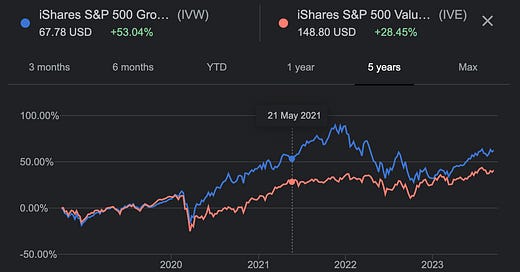Curious about achieving financial freedom? Let's chat! Click here to get in touch!
Have an opinion on our content? We're all ears! Comment your thoughts below.
"The stock market is filled with individuals who know the price of everything, but the value of nothing." - Philip Fisher
Investors like Philip Fisher remind us that simply chasing hot stocks without understanding their underlying value can lead to risky decisions. In a world where technology is constantly reshaping industries and driving innovation, is value investing still the right approach? In this edition, we delve into the timeless debate of value versus growth investing, debunk common misconceptions and help you navigate these two distinct strategies.
Value vs. Growth Stocks - Why Are They Important?
Value Stocks are stocks that are believed to be trading below their underlying value. Investors in value stocks are looking for companies that are undervalued by the market, often characterized by low price-to-earnings (P/E) ratios and stable dividend yields. Value stocks are considered more stable and are often associated with well-established, dividend-paying companies. The downside of value stocks is if the market has already priced the stock correctly, there may be limited upside.
Growth stocks are shares in companies expected to have above-average earnings growth in the future. These companies typically reinvest their profits to expand operations, and they often have high P/E ratios. Growth stocks are more aggressive and are often found in innovative and rapidly expanding industries like technology and healthcare.
Expectations for companies to deliver on ambitious plans make growth stocks riskier. If those plans don’t pan out, share prices will decline.
Things to Know About Both
Value Stocks (The following information is only for educational purpose and not an investment advice)
Example: Bank of America Corporation (BAC), United Airlines ( UAL)





